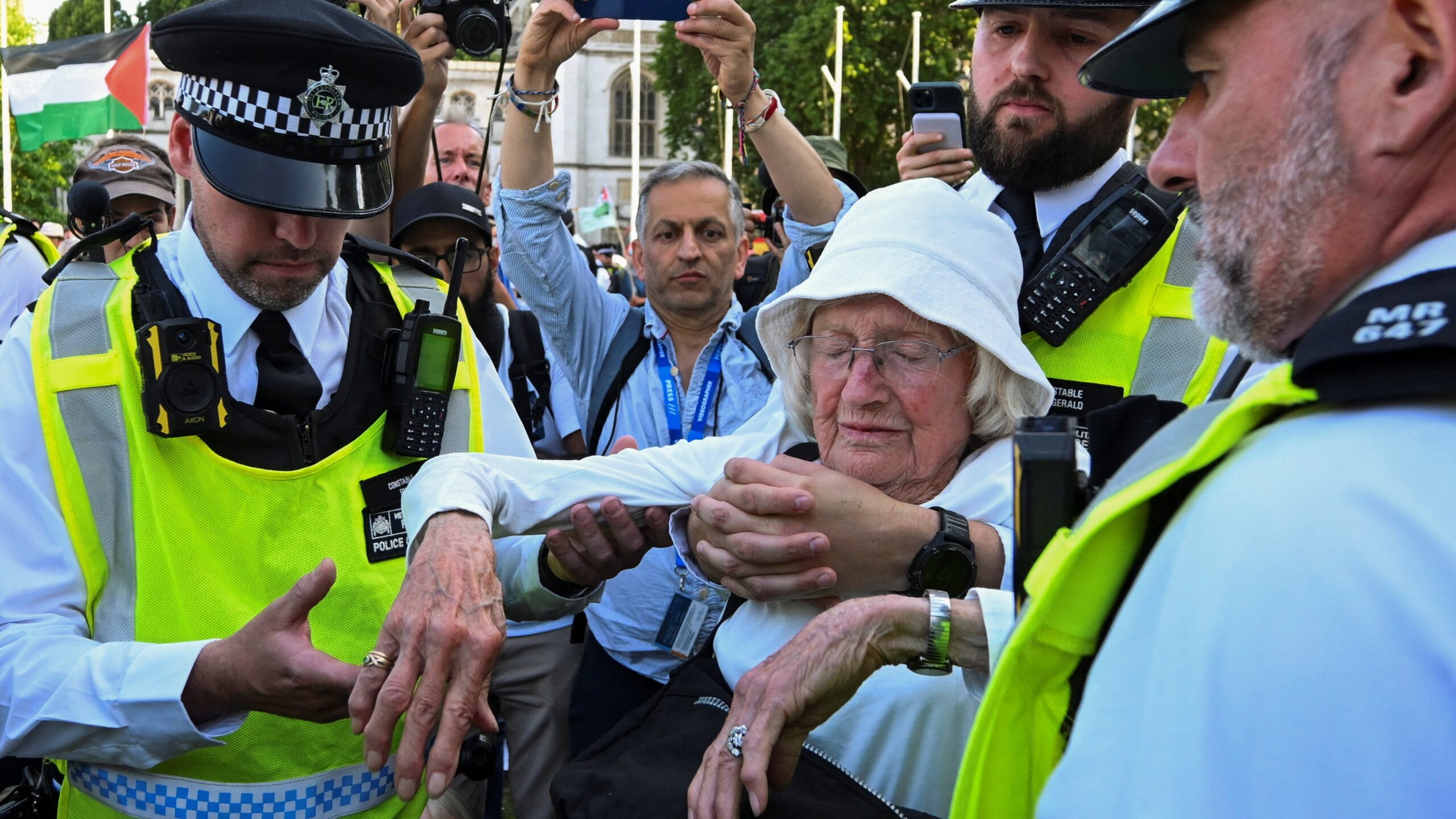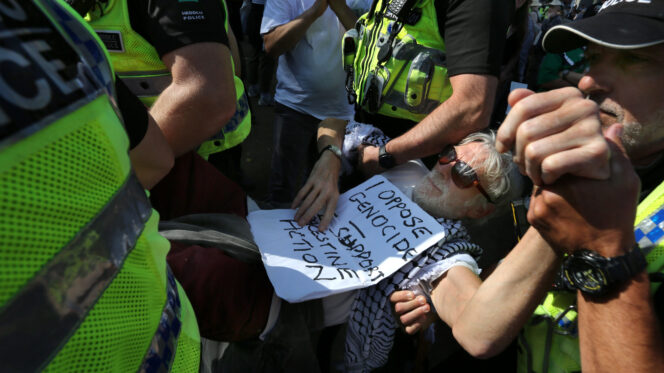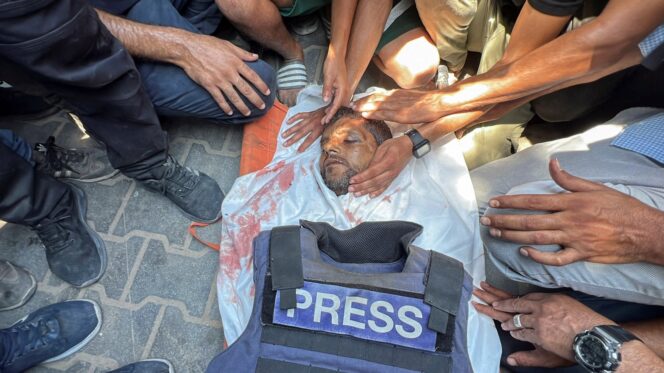Police Officers Admit They Feel ‘Ashamed’ Enforcing ‘Mad’ Palestine Action Ban
‘This is not the work I came into the police to be doing.’
by Harriet Williamson
4 September 2025

Enforcing the Palestine Action ban is exhausting, unsustainable and making cops miserable, Met officers, government lawyers and the police federation have told Novara Media.
One officer described feeling “ashamed and sick” when they arrested a disabled person on terror charges. “That feeling won’t leave me anytime soon,” they said. Another told an arrestee it’s “not the work I came into the police to be doing”.
A Police Federation spokesperson, meanwhile, criticised the fact there are “no ‘extra’ officers” to police Palestine Action protests, putting London’s Met police in particular at high risk of burnout. “Officers are emotionally and physically exhausted,” the spokesperson said. “The demand is relentless. And it’s not sustainable.”
Police have arrested over 700 people since Palestine Action was proscribed as a terrorist organisation on 5 July. At the largest protest, in Parliament Square on 9 August, nearly half (49.9%) of the 532 people arrested were aged 60 or older, according to the Met. It was the largest mass arrest in London since 1961. Nearly 100 of those detained were in their 70s, and 15 were in their 80s.
Palestine Action is the first non-violent direct action group to be designated a terrorist organisation in the UK. Showing support for the group can carry a maximum sentence of up to 14 years in prison.
The majority of arrests have been for simply sitting quietly on the ground holding handwritten cardboard signs that read “I oppose genocide. I support Palestine Action” at demonstrations organised by campaign group Defend Our Juries (DOJ). Those arrested include a blind man in a wheelchair and an 83-year-old priest.
On Saturday 6 September, police will have to do it all over again – likely on an unprecedented scale, with more than 1,000 people having signed up to break the law.
Meanwhile, members of the public have targeted police officers with widespread and sometimes very personal criticism during arrests in Parliament Square. In addition to challenging their decision to enforce the ban and urging them to use discretion, protesters have likened police to Nazis and called them fascists, identified some officers by name and asked if their parents are ashamed, and staged loud conversations in front of brown and Muslim officers about how they have ‘betrayed their communities’.
On 9 August, some officers looked close to tears, according to our reporter, with one describing the day as “carnage”. Afterwards, a Met spokesperson said the force faced “entirely unrealistic” challenges in policing the protest.
Officer A, who described feeling “ashamed and sick” to Novara Media on the condition of anonymity, said they were following orders that they didn’t believe in. “I was told to help in the arrest of a disabled person for holding up the sign stating they opposed genocide and supported Palestine Action, which I did.
“I did it knowing it had nothing to do with upholding justice or our professional values, just to protect my job and livelihood. My father was an officer, and the reason I came into the police. I know he would be ashamed and turning in his grave if he saw what I did.
“I was at the protests and stood there with people shouting in my face calling me a pig and other names. I don’t blame the public at all. In my silence, they didn’t realise I agreed with everything they were saying but stating that openly would mean the end of my job. My managers don’t support what we have to do either, but they don’t make the law and just have to follow what the ministers decide.”
So far, 73 people have been charged with allegedly showing support for Palestine Action. 67 of them were arrested in central London on either 5 July or 12 July, and their ages range from 21 to 83-years-old. Six are DOJ spokespeople, charged on 3 September after dawn raid arrests for offences relating to allegedly arranging public demonstrations and managing Zoom meetings.
“Instead of catching real criminals and terrorists, we are arresting pensioners and disabled people calling for the saving of children’s lives,” Officer A continued. “It makes me question why I’m even in this career anymore.”
Another Met officer told Novara Media that “many officers are stuck between what everyone is witnessing in terms of genocide” and what they are being ordered to do in terms of enforcing the ban on Palestine Action.
“It causes a moral and ethical dilemma,” Officer B, who is Muslim, said. They explained that while Muslim officers face an “unprecedented level” of abuse, they also feel high levels of “guilt for not being able to have a say on genocide”. The officer said Muslim police face pushback from within their own communities, including accusations of being “kafir [unbeliever/truth denier in Arabic] traitors”.
After being arrested on 5 July, climate writer Donnachadh McCarthy described multiple interactions with Met police who said they were unhappy with the Palestine Action ban. “One officer told me, ‘This is not the work I came into the police to be doing. I would far prefer to be doing my proper job catching real thieves,’” he said.
During McCarthy’s brief detention at Croydon police station, he said his arresting officer “paused as he was about to close the [cell] door on me and said ‘This is mad. I can understand them arresting Hamas members, but for people holding a placard, this doesn’t make any sense to me’.”
McCarthy also recounted how, when the charging sergeant handed back a plastic bag of McCarthy’s belongings, a white rose he’d been given at the protest fell out. According to McCarthy: “He [the charging sergeant] picked up the rose, looked at three other officers who were beside me during the discharge process, and asked, ‘Do you know what this stands for? This was the symbol they chose after World War II to symbolise the mass slaughter by Nazism’. He then paused and said: ‘And so very pertinent in this moment.’”
McCarthy said he was moved to tears by the charging sergeant’s words.
Discontent and demoralisation in the criminal justice system extend further than just the police force. A lawyer for the Crown Prosecution Service (CPS), who also wanted to remain anonymous for fear of reprisals, told Novara Media that the proscription of Palestine Action under the Terrorism Act 2000 is “an abuse of terror laws against the interests of justice” and this is “clear to all prosecutors”.
According to the lawyer, CPS senior management doesn’t openly acknowledge the abuse because “challenging ministers on enacted law is beyond their remit and such a discussion wouldn’t be healthy for their career longevity”.
The lawyer described a CPS culture of fear, where prosecutors are “too scared to openly raise the abuse of terror laws for political motives” with management, because it would mean “being seen as a maverick, targeted and eventually removed one way or another”.
The lawyer said it was police officers, however, that he felt for, as they are on the sharp end of enforcing the law and face serious repercussions if they refuse to do as they are told. “Police officers have a harder time, as those in London can be put into a protest and have to physically stand against a moral cause they privately support, whilst arresting conscientious people – including vicars, blind people in wheelchairs and ex-magistrates – that are trying to stop the mass murder of children in Gaza.”
The light at the end of the tunnel, he said, is that he believes the ban, which is set for judicial review in November, won’t last. “I can’t see it being sustained in the long term because it screams injustice so loudly,” he said.
DOJ co-founder and former government lawyer Tim Crosland, who has been arrested and charged since speaking to Novara Media and remains in police custody, said: “Overwhelmingly, people are reporting a sense of police being really unhappy about this, both from the moral point of view and the practical point of view. This is not what they signed up for.”
“The police, like all public services at the moment, are under strain. There’s been a lot of public unhappiness that you just couldn’t get someone to respond to a burglary. When the taxpayer is watching those same police that don’t have the resources to respond to what the average person considers the role of the police is, and they watch them dragging retired people, disabled people, all kinds of people who pose no danger or threat to anybody into police vans for peaceful protests – the public don’t like that.
“It’s painful for the police to be watched by the public – who they need to have a relationship with – knowing the public is thinking, ‘What are you doing?’”
Additional reporting by Charlotte England.
Harriet Williamson is a commissioning editor and reporter for Novara Media.


